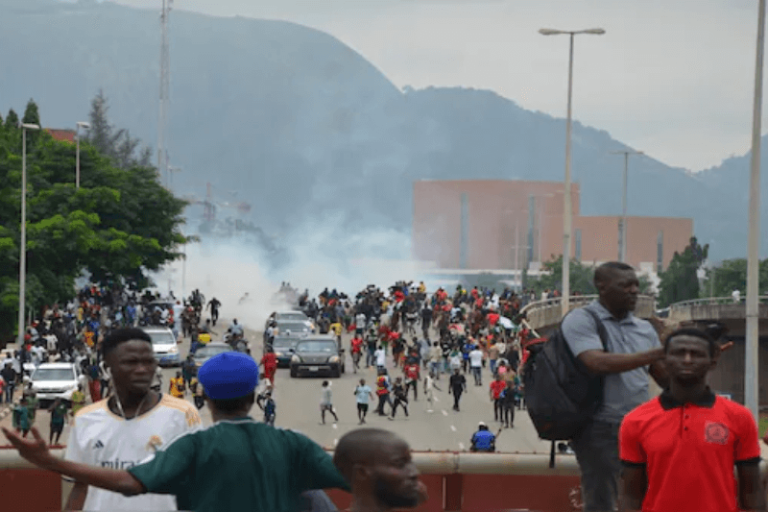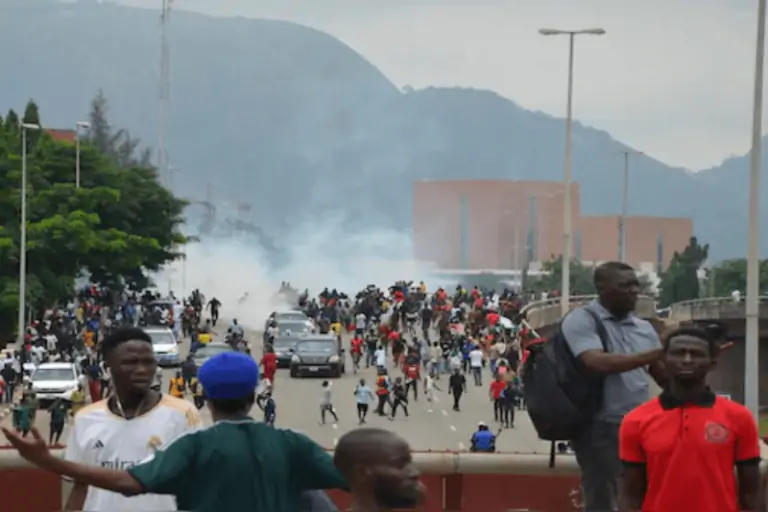

13 nigerian protestors dead in violent mass demonstrations over economic crisis
According to a rights group Friday, at least 13 protestors were killed amid major demonstrations in Nigeria against the nation’s economic problems that descended upon multiple states and became violent. Authorities verified four bomb-related fatalities as well as hundreds of arrests during the demonstrations setting curfews in many states.
In an interview, the director of Amnesty International in Nigeria Isa Sanusi said that it independently confirmed the deaths claimed by lawyers, families of the victims, and eyewitnesses. Nigerian police reported that more than three hundred demonstrators were arrested and that curfews were imposed in the northern states of Kano and Katsina following government and public property looting. Along with several others hurt, one police officer passed away.
The demonstrations mostly focused on claimed poor government in the nation and food shortages. Despite being one of the top oil producers in Africa, Nigeria’s governmental officials—often accused of corruption—are among the best paid in the continent, a startling contrast in a nation with some of the poorest and hungriest population.
Carrying placards, bells, and Nigeria’s green-and- white flag, demonstrators chanted songs as they listed their demands, including the reinstatement of gas and electricity subsidies, whose removal as part of the government’s audacious reforms to grow the economy has had a knock-on effect on almost everything else.
The demonstrations began gently but quickly descended into violence as resentment boiled over. Tragic deaths were caused when demonstrators ran against security personnel. Although the curfews enforced in Kano and Katsina were meant to bring about order, they have also raised questions about the limitation of civil liberties.
The demonstrations highlight the growing unhappiness among Nigerians dealing with rising food costs, unemployment, and general poverty. Though Nigeria boasts the biggest economy in Africa, the wealth gap there is clear and many people feel their leaders leave behind them behind.
Particularly divisive have been government– initiated economic changes including the elimination of gasoline subsidies. Although these policies are meant to help to stabilize the economy and lessen dependency on imports, they have greatly raised living expenses, therefore aggravating the situation of common Nigerians.
President Bola Tinubu has responded to the demonstrations by urging peace and pledging to attend to the complaints of the demonstrators. In a broadcast speech, he recognized the difficulties that many Nigerians experience but advised patience while his government works toward long-term fixes.
Many Nigerians, meanwhile, remain dubious, pointing out a past of broken promises and pervasive corruption. Adeola Ogunleye, a Lagos protestor, stated, “The government needs to act right away to reduce the suffering of the people.” “We cannot carry on living like this.”
Concern about the situation in Nigeria has also been voiced by the world society. Emphasizing the need of tackling the underlying reasons of the demonstrations, the United Nations urged moderation from all parties. Said a UN spokesman, “We urge the Nigerian government to listen to the voices of its people and take meaningful steps to improve their living conditions.”
The resiliency and will of the Nigerian people are clearly shown as the situation develops. The demonstrations have drawn attention to the country’s much needed social and economic changes. Whether the administration will act specifically to handle these problems or if the demonstrations would keep getting more intense is still to be seen.
US Secretary of State Marco Rubio ordered South African Ambassador Ebrahim Rasool to leave America by March 21 because he…
Early 2025 ends with IPL fever in India and cricket fans receive good news of an international schedule full of…
National teams from Africa advance their World Cup qualification pursuit as they take part in Matchday 5 of the qualifiers.…
Creative Africa Nexus (CANEX) is running the Book Factory Prize for Publishing in Africa again to award $28,000 to African…
Canadian companies have expanded their presence as major African mining stakeholders and invested more than $37 billion. Africa holds the…
The South African government wants people to plant one million trees across the nation within a single day on September…
This website uses cookies.